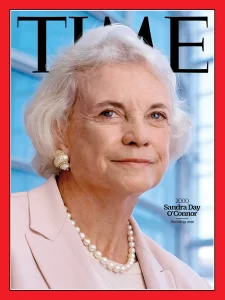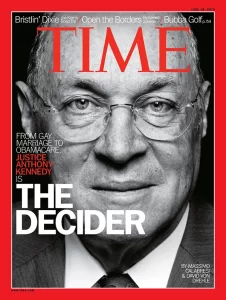The Dobbs dissent made little effort to defend the handicraft of Justice Blackmun in Roe. And the dissenters didn’t bother to endorse the “mystery of human life” pablum from Casey. But Justices Breyer, Sotomayor, and Kagan did heap praise on the stare decisis discussion from Casey–in particular, the focus on the Court’s “legitimacy.”
The joint dissenters wrote that overruling Roe would extract a “terrible price.”
Casey itself made the last point in explaining why it would not overrule Roe—though some members of its majority might not have joined Roe in the first instance. . . . And to overrule for that reason? Quoting Justice Stewart, Casey explained that to do so—to reverse prior law “upon a ground no firmer than a change in [the Court’s] membership”—would invite the view that “this institution is little different from the two political branches of the Government.” No view, Casey thought, could do “more lasting injury to this Court and to the system of law which it is our abiding mission to serve.” For overruling Roe, Casey concluded, the Court would pay a “terrible price.”
Next, the joint dissenters wrote an encomium for Justices O’Connor, Kennedy, and Souter.
The Justices who wrote those words—O’Connor, Kennedy, and Souter—they were judges of wisdom.
We learn that Justices O’Connor, Kennedy, and Souter are “judges of wisdom.” For evidence of this wisdom, let me quote from Casey.
At the heart of liberty is the right to define one’s own concept of existence, of meaning, of the universe, and of the mystery of human life. Beliefs about these matters could not define the attributes of personhood were they formed under compulsion of the State.
I know that the joint dissenters are fond of quoting from Justice Scalia. His rebuke from Obergefell is apt:
If, even as the price to be paid for a fifth vote, I ever joined an opinion for the Court that began: “The Constitution promises liberty to all within its reach, a liberty that includes certain specific rights that allow persons, within a lawful realm, to define and express their identity,” I would hide my head in a bag. The Supreme Court of the United States has descended from the disciplined legal reasoning of John Marshall and Joseph Story to the mystical aphorisms of the fortune cookie.
Casey did not exude “wisdom.” Nor did it demonstrate judging for that matter. Casey demonstrated a political calculation of the worst sort–engage in blatant misreading of precedent, carve a new rule out of whole cloth, and hope things work out. Not much wisdom here. Perhaps, to borrow from Fifth Circuit lingo, they exhibited minor wisdom.
The joint dissenters continue:
[Justice O’Connor, Kennedy, and Souter] would not have won any contests for the kind of ideological purity some court watchers want Justices to deliver. But if there were awards for Justices who left this Court better than they found it? And who for that reason left this country better? And the rule of law stronger? Sign those Justices up.
There is a lot to unpack here. First, the joint dissenters have launched an attack on their recently-nominated colleagues who apparently passed an “ideological purity” and “deliver” the expected results to appease “some court watchers” (me!). (FYI, none of them pass my ideological purity test.) This statement is as much a rebuke of Justice Gorsuch, Kavanaugh, and Barrett–the young and the restless–than it is a praise of O’Connor, Kennedy, and Souter. Then again, we got the latter three because of the decisions of the former three. No more Souters!
Second, the joint dissenters charge that O’Connor, Kennedy, and Souter would not win any awards or prizes. Oh come on. In light of Casey and related cases, these judges were praised at every opportunity. There is actually a Wikipedia page that lists all the prizes and honorary degrees that Sandra Day O’Connor received. They are not lacking for honors. Liberals love conservatives who vote with liberals. You don’t make it to the cover of Time Magazine by standing for conservative judicial principles.


Third, what the joint dissenters meant is that O’Connor and Kennedy would not receive praise from conservatives. Fair point. But when you are accepted at every level of elite society, who needs to hobnob at the Mayflower with other FedSoc grunts?
In my view, one of the most significant aspects of Dobbs is that we can move past the entire “stare decisis” and “legitimacy” debate. The Court did the deed. Roe is gone. The chips will fall where they may. The political process will work itself through. But the Justices themselves will no longer feel constrained by the Casey fiction that decisions must be made with regard to popular opinion. Courage “under fire” means ruling without regard to those public currents.
The post The "Judges of Wisdom" and the "Mystical Aphorisms of the Fortune Cookie" appeared first on Reason.com.
from Latest https://ift.tt/uTqnRbI
via IFTTT